I’ve seen The Force Awakens twice since it came out, and I was trying to figure out what exactly made it so compelling to me. I finally realized that it honors a tradition from the Original Trilogy: in the midst of an often cartoonish space opera, it’s the moments of heroic vulnerability—not moments of action—that define the series. The more I thought about it, the more I came to believe that this is the emotional undercurrent that kept the trilogy so vital, and the fact that The Force Awakens embraces this theme is part of the newest film’s success.
Spoilers for The Force Awakens to follow.
The Force Awakens has been out for a few weeks now, so we can talk about Han’s death. It’s terrible and heart-wrenching, but on the second viewing, I realized that from the moment Leia asks him to “bring back our son,” Han knows his death warrant has been signed. Each thing that might save him falls away. Finn doesn’t have a real plan, so Han and Chewie have to plant the detonators; Kylo Ren comes into the room; Han watches Kylo, working up his courage, and finally goes to him, knowing what will happen. This moment, when Han chooses to make himself vulnerable to his son, continues a tradition of unique heroism that began in the Original Trilogy.
In A New Hope, the moment of vulnerability is obvious, and it sets the tone for the rest of the series. Luke, against all the advice of the Rebellion, and presumably the screaming of his conscious mind, turns his targeting equipment off and opens himself up to the Force. This builds on Obi-Wan’s earlier assertion that he’d made his first step into a larger world when he first tried to practice blind. It seems odd to think about it, but these are the only two times we see Luke tapping into the Force in the first film—his few minutes of practice on the Falcon, and then the shot he takes at the Death Star. Everything in between those points are standard issue action movie behavior: rescue the princess, escape the stormtroopers, watch your mentor die, shoot enemies you can see with guns that work logically… But suddenly Luke throws all of that out the window to listen to a ghost and open himself up not just to the Force, but to failure.
If the Force doesn’t guide him, and he misses, the whole mission has failed and the Rebellion is probably defeated. If turning his equipment up makes him more vulnerable to attack from Vader, and he’s killed, well, there goes the adventure he’s just set out on, and the larger world he’s only begun to see. Either way this is the defining moment of his existence, and sends him down a path of his own choosing.
Earlier, Luke refused Obi-Wan’s Call to Adventure, and only decided to join him on the trip to Alderaan after Owen and Beru are murdered. He’s takes the chance to learn about the Force from Obi-Wan, but what were his other options? Stay, and keep on moisture-farming? Join the Empire he now hates, just to get away from Tatooine? His only skill is flying, and he imprints on Obi-Wan like a well-feathered duckling because this is literally the first time he’s been able to talk about his father without being shushed. He’s reactionary for most of the film, forced into corners and making the best of bad situations. True, he does choose to rescue Leia, but even then he comes to that decision only after he and his companions are forcibly taken on board the Star Destroyer. Finally, at the end of the film, in the privacy of his X-Wing, he is faced with a definitive choice—trust in the Force, and Ben’s teaching, or use the tech he’s been trained with, and the skill we already know he has. He’s a good pilot, he’s a good shot—he probably stands a good chance of destroying the Death Star on his own. But he chooses to drop his defenses and let the Force in. This is the first decision he makes as a Jedi.
In Empire Strikes Back, Leia gets her own big moment of vulnerability, putting aside her usual matter-of-fact demeanor and throwing herself into a moment. She tells Han she loves him, even though she doesn’t have to. He’s about to be frozen, and she has no idea how much longer she has to live. Vader’s promises can’t be trusted so she must know that if she’s loaded onto his ship she most likely isn’t coming off of it again. She could keep up a brave face, as Han does—she could try to be cool. Instead, she chooses to tell Han the truth to give him something to hold on to, and in return he says “I know”—both to stay strong himself, and possibly, to give her an out. If she lives and he doesn’t, she might be able to move on from the scruffy-looking nerf-herder who couldn’t ever drop the facade.
Han for the record, is never vulnerable in the Original Trilogy. Even when he’s blinded from carbonite sickness, he’s still cracking jokes, teasing Luke, and trying to talk his way out of death. There is never a moment of real fear or pain, and he just rolls with everything, even the fact that Lando—who was in the process of betraying him that last time he was conscious—is inexplicably helping with the rescue. (He’s so cool with it that he in turn helps rescue Lando from the Sarlaac.)
But Leia? Leia opens herself up to her feelings for Han, and, as we now know from The Force Awakens, this relationship defines a large part of her later life. In the new, FA-based canon, her time with Han may have had good moments, but their son’s fall to the Dark Side has largely overshadowed those good memories. She is now the mother of a wannabe-Vader, and the former partner of a smuggler whose cons aren’t working anymore. Her declaration of love has shaped who she is 30 years down the line.
Return of the Jedi makes a very interesting choice, one that, for me at least, defines the Original Trilogy: Instead of culminating with a straightforward battle between “good” (Luke) and “evil” (Vader), the film doubles down on Luke’s earlier moment of placing his trust in the Force. By going to Vader and refusing to fight, he offers himself up as a sacrifice to his father’s better nature. And, to the film’s credit, Luke’s struggle with the Force is taken completely seriously. He lashes out at the Emperor when it becomes clear that his friends are being massacred. He attacks Vader when he realizes that he’s given Leia away. Twice he falters, and almost gives in to violence. But each time he pulls himself back, which makes the final scene all the more powerful. This stands in stark contrast to the climax of The Empire Strikes Back. When Vader cuts his hand off and asks him to join the Dark Side, Luke chooses to drop to what seems to be certain death. But there is plenty of ambiguity in this moment. Is Luke rejecting the Dark Side? Is he rejecting his father’s true identity? Is he allowing the Force to guide him, or is he acting on his emotions? The moment (which is my favorite in the entire series) is open to interpretation. Luke’s choice to spare Vader in RotJ is not.
After striking out at the Emperor, and seeing that his father is still defending him, he gives up again, even though he knows it’s hopeless now. After fighting Vader to a standstill, defeating his father in a battle, he stops short. Luke has the upper hand; he could kill Vader in a moment, and maybe even have enough strength to at least wound the Emperor. Or he could turn to the Dark Side, as Mark Hamill himself thought he should (and as I thought he would, the first time I watched the film). But he rejects both of those choices, too. He stops fighting, refuses to kill his father, and, in the ultimate moment of neck-baring, throws his lightsaber away. This isn’t choosing death, this is choosing torture, this is choosing to watch all of his friends die, this is choosing an utter nightmare, all so that he can prove to his father, and to himself, that the Light Side of the Force is as strong as the Dark. This changes the course of Anakin’s life, and ultimately the galaxy’s, as Vader turns on Palpatine. Which leads us to considering Anakin. Does he ever have such a moment?
If I wanted to, I could cite endless reasons why the prequels don’t really work as films. (As visual art? As worldbuilding? Heck yeah. Just not as film.) But the real thing is simply that due to a combination of on-the-nose dialogue and stiff acting, there are no moments of true vulnerability. Obi Wan is the Han for these movies, throwing out quips left and right. Anakin is the romantic hero, and Padme is the sensible senator who wants to do right by her people. None of them have the moment of true vulnerability that would have given the films a heart. Padme should, since she becomes pregnant and then has to face Anakin’s turn to the Dark Side, but since they never have a believable connection begin with, there’s little emotion when she leaves him. Anakin has a few opportunities: leaving his mother, returning to find her murdered, learning Palpatine’s true identity, and finally, the most obvious one, the climatic fight with Obi Wan. None of these moments land because everyone involved states the obvious at all times. There is no subtext, there are no “I love you” / “I know”-style twists. People say what they mean. Anakin screams “I hate you!” at Obi Wan, but imagine the movie where he says he loves Obi Wan in that moment instead. The movie where Padme turns cold, and buries her love, and leaves Anakin without tears, but opens up to Obi Wan later. The movie where Padme lives, but has to give her children up for their own safety, and live knowing that Vader could come for her at any time.
The closest the prequels come to that real moment is Obi Wan screaming that Anakin was the Chosen One—but even then Obi Wan has the high ground, both physically and emotionally. There’s no danger, and the emotional impact is lost in all that lava.
Han finally gets his moment in The Force Awakens. He kept himself cool (uh, no pun intended) during the freezing process; he never lost his witty exterior throughout the dangers of Stormtroopers and human-flesh-craving Ewoks in RotJ; and even when he was faced with Leia loving Luke, he kept it together: he simply offered to stay out of their way so they could be happy together. We thought he’d made it through the series with his cool exterior intact. An entire generation of SW fans grew up and had kids with only this Han in their minds: iconic vest, quips, last minute heroism, the shrug when he cons the Empire into surrendering to him. It’s a testament to his coolness that the Han Shot First/Shot Solo argument even existed. People were so angry about the idea of their hero being outgunned that it became the focal point of the backlash against George Lucas.
The Force Awakens throws that away like an unneeded weapon. Han is older, broken, still trying to con people, still trying to be slick, but he can’t really do it the way he used to. And no, it’s not because he’s older, it’s because he’s suffered now. He and Leia may well have drifted apart anyway—their relationship was always volatile even in the first three films. But losing Ben? Waking up every morning and knowing that your son rejected you, and chose a life of darkness? There’s no quip that can fix that. So here, thirty years later, we finally get Han’s moment: not with Leia but with their son.
But it begins sooner than that, I think. As soon as Leia asks Han to “go get our son” the look in Han’s eyes tells us that he knows he’s a dead man. When I watched the film the first time, I realized then that I was about to watch this character die, and I actually missed most of Rey’s rescue because I was waiting. This was good, the way the movie warned us, almost subliminally, that we were about to see something terrible. It made it easier, to know along with Han. Watching it a second time I was able to pick out the nuances. He tells Chewie to go up to set the charges on the upper levels of the Starkiller Base, which gets him out of the way. He also gives him the detonator, which means their plan still has a chance even if Han’s not there to see it through. He can trust Chewie. The kids are safely outside. Leia’s far away—she’s not there to see him fail, or rise to the challenge of facing Ben. Even knowing all of this, Han considers bolting. When he sees Ben on the catwalk, you can see it in his face. He could run, blow the place, kill his son, and deal with the grief for the rest of his life…but at least he’d have a life. But of course he doesn’t run. He lives in a universe where heroism, true heroism, is defined by vulnerability. By trust. And it’s his turn to be the hero now, not Finn’s or Rey’s.
When he faces Ben, he never reaches for weaponry. For all that we mock Emo Kylo Ren (and believe me, we do) he’s still a Force-user, trained by Luke Skywalker. We’ve seen him probe people’s minds and stop blaster shots in mid-air. Han is totally outmatched here. But the point is he doesn’t even try to defend himself. In fact, he stands so close to his son that he doesn’t leave room to draw a blaster even if he wants to. And I would argue that he isn’t trying to talk his way out of anything, he isn’t trying to be charming. The words he uses on Ben are not a line. He’s just pleading with his son to come back, and when he son opens up to him, he replies that he’ll do “anything” for him. And it’s that, that “everything”, knowing that he’s talking to a murderer but only seeing his child, that is his real moment of heroism. And, as with the others, it defines his life, becomes the moment of his death, and defines where the universe will go from here. In that moment, Han becomes a martyr, Kylo Ren earns the hatred of Chewbacca, Finn, and Rey, and the Star Wars Universe gains its most hated villain.
After we all saw the film the first time, my friends and I debated whether Kylo Ren could be redeemed. How can anyone come back from that? How could anyone be forgiven for murdering someone we’ve all loved for decades? This conversation eventually spun into this post: is there an act of vulnerability meaningful enough to redeem Kylo Ren? Will it fall to him to create the emotional fulcrum of the next film?
Leah Schnelbach experienced her own moment of vulnerability when Han Solo stepped out on that catwalk, and she hasn’t recovered yet. Come weep with her on Twitter!










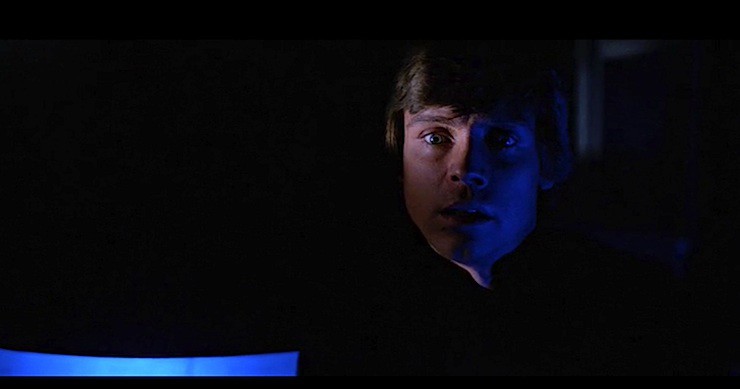
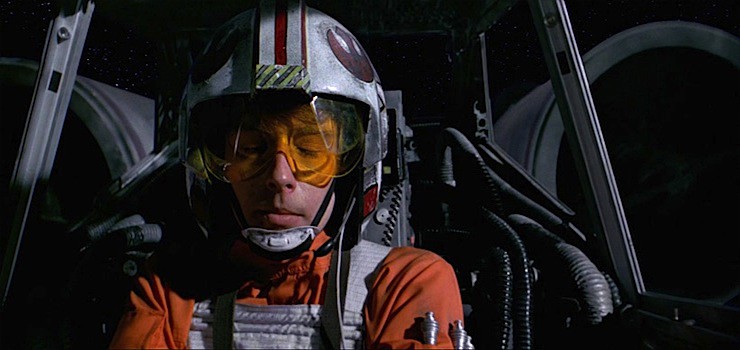
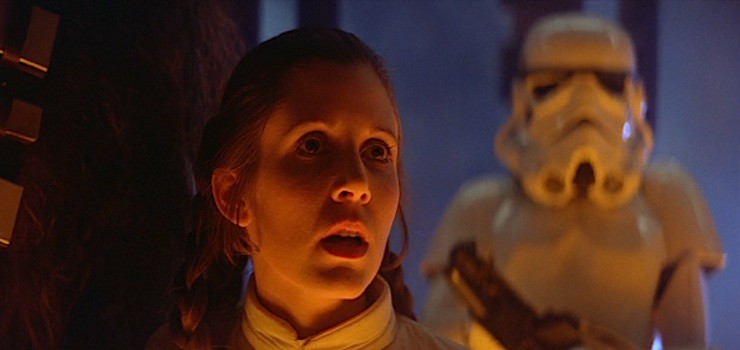
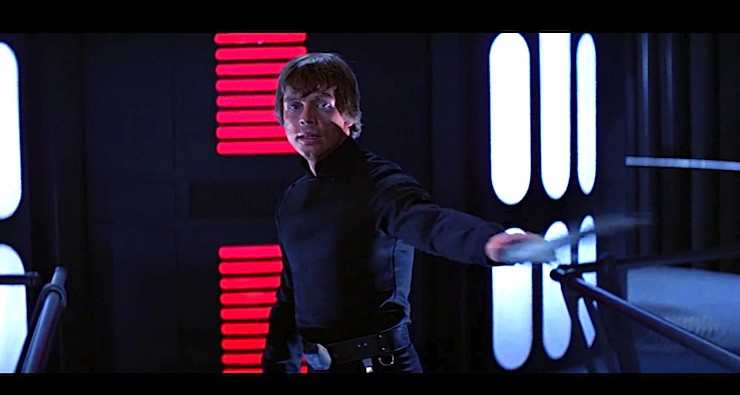
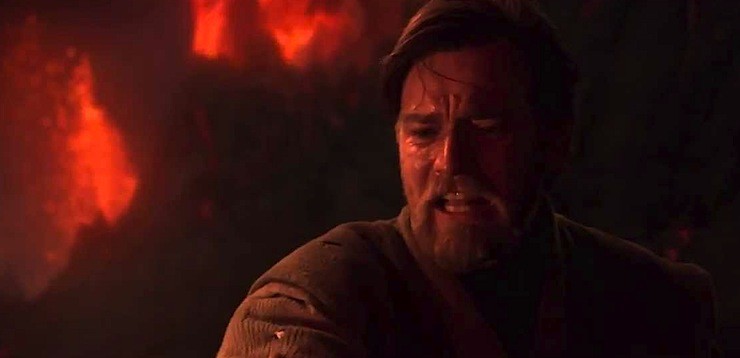
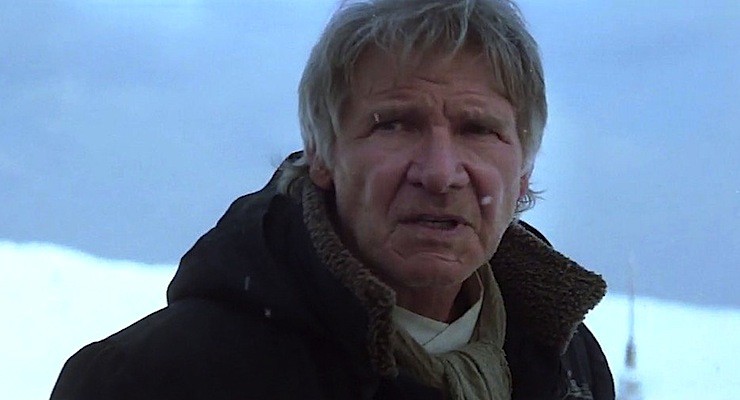
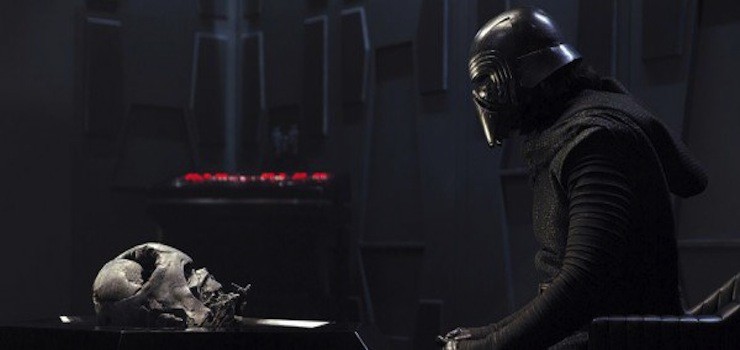
Han screaming while being tortured qualifies as “real fear or pain” to me.
Han screaming while being tortured is real pain, but Han even said that they never asked him anything. His torture was just the lure to bring Luke to Vader.
Thanks for clarifying what was been edging around my feelings about Star Wars as a whole, and Han’s choices in TFA.
Han for the record, is never vulnerable in the Original Trilogy.
Um……
“You love him, don’t you?”
is there an act of vulnerability meaningful enough to redeem Kylo Ren?
Should there be? From the established character there is a good argument that he should not. He idolizes Vader but doesn’t understand him; Ben copies his grandfather without having what made Anakin special, or apparently even knowing that there was more than the appearance.
Redemption is a rare and special thing. That Anakin – a literal demigod – experienced it is in keeping with the fact that he flat out is a being of divine origin. That Ben would fail to acknowledge this, as he fails to understand so much else, and suffer as a result is keeping with the character.
Is there any particular reason Ben should get the same fate as the being of myth he imagines himself to be?
I don’t think think there’s any path to redemption for Kylo except Vader’s. If that murder was the ultimate act of hatred, then how can anything less an equal act of love make up for it? And, well, “no man hath greater love than this…”
I think the fulcrum of the next movie will be Luke’s vulnerability. At least, he’s going to have to open up to Rey to help make sure she doesn’t repeat his mistakes. He’ll probably be confronted by Leia, too.
I agree with your article, it’s an interesting analysis.
I’d like to point out that while the remote practice and the shot that blows up the Death Star are the only times we see Luke consciously call upon the Force, the movie makes it quite obvious that his outstanding piloting and gunning abilities (and I’d argue that all the action-ey stuff he does on the Death Star without having ever had any training) are due to the fact that he is strong in the Force.
And turning his targetting equipment on doesn’t make him a better target for Vader, I don’t believe that’s impliued. It’s just that trusting the computer will be less accurate than trusting the Force.
There is that time that when he hears his friend is lost in the snows and night is on, he kinda panics and plunges out into the cold anyway in a desperate quest to find him, a quest that by rights ought to have ended in cold ugly death for both of them. He’s a little vulnerable then. And also all the while in Empire when he is trying to say goodbye to Leia on Hoth too.
I think he can still be redeemed. Because the reason Han walked out onto that gangway was because he loved his son and wanted to save him. Even being killed by him, Han would want his son to still go back to Leia. She would know that, and so would Luke. Love is the most important driving force when it comes to redeeming someone. And turning back to the good side would create in Kylo Ren my favourite kind of good guy – the one who is flawed and has a tragic past that he feels he has to make up for.
“..the prequels don’t really work as films. … But the real thing is simply that due to a combination of on-the-nose dialogue and stiff acting, there are no moments of true vulnerability.”
I beg to differ. The lack of moments of vulnerability is why the prequels work to tell THEIR story.
The prequels were a completely different type of story. The original trilogy was a “hero’s journey” story. The prequels were a FAILD hero’s journey. Their goal was to the be the opposite of the original trilogy. If the heroes had their moments of vulnerability then they would have won, Palpatine would have been defeated, the Republic would have never fallen, and there would be no original trilogy.
Anakin failed as a hero. Obi Wan failed as a mentor. The Jedi failed the galaxy.
In the 2 pivotal moments in the Star Wars saga we see Anakin\Vader watching Palpatine throw lightning at a Jedi. Mace Windu the first time Luke the second. In contrast to Luke, Mace was in a position of strength. Palpatine had been beaten and was the vulnerable one. Where Luke threw away his lightsaber Mace chose to execute Palpatine on the spot. Mace failed Luke was right.
The lack of vulnerability in the prequels was intentional not an accident.
Anakin and Obi Wan DO finally have there vulnerable moments. Obi Wan when he allowed Vader to strike him down and Anakin when he sacrificed his life to save his son. Their moments just did not belong in the prequils.
@7 EXACTLY
Since you got me going on my HAN FEELZ, I’d also like to point out how devastating we can see all those moments of vulnerability were to Han. When Leia rejects him on Hoth, he holds his grudge even as he’s saving her life. When see his fear and gratitude when Luke survives, and again when he learns that Leia’s love for Luke doesn’t preclude a love for him.
@9, This is so true, and I think that’s where the audience support collapses, because because despite moments where the story beats feel like they should be victorious, they aren’t.
It’s hard to be happy Anakin wins the pod race when you know that he has to leave his mother behind AND he grows into a genocidal monster.
It’s hard to celebrate Padme’s powerful speech in the Senate when that speech puts Palpatine in power.
You can’t be happy when the clones show up, because you know it ends badly. You can’t appreciate Jar Jar trying to do what is right, when it is OH SO WRONG.
Yet at times, it feels like the movie DOES want us to cheer these moments, and it is a disconnect.
Aeryl, #10: “it feels like the movie DOES want us to cheer these moments”
Back in “The Phantom Menace” days, I was a big Qui-Gon fan, and hung out online with a bunch of like-minded folks. One woman there was a music scholar. (???) I’m not sure of the term; she studied music theory, and understood how music is constructed and how it works on emotion.
When Qui-Gon lies dying with Obi-Wan at his side, the music playing extends a note in the verse (or whatever instrumentals have.) When the song ends, Qui-Gon dies.
If that sounds confusing, imagine Bill Murray singing the “Star Wars” theme: “Star Wars, nothing but Star Wars…” but doing so as “Star Wars, nothing but Staaaaaaaaaaa…” You’d find yourself waiting for “Waaaaaaars.” The effect during the Qui-Gon scene is his death is prolonged, and our order-craving brains want that next note, effectively making us kinda want Qui-Gon to pass away.
Although the new movie left me feeling quite sad about a great number of things, one part I really dug was Han’s explanation of The Force. He dropped his cool demeanor, becoming awestruck and almost starry-eyed; he even comments on his previous cynical view.
@9 – Brooks: Good analysis. The prequels are deeply flawed, and don’t really work as movies, but those things you mention are true.
As much as I want some kind of happy ending (even if it can’t be as warm and fuzzy as the end of Return of the Jedi), I don’t know if I want to see Kylo Ren redeemed quite as much as Vader. Somehow he’s worse now. Forgiven for murdering his father? Maybe. Forgiven or pardoned somehow for being complicit in the murder of untold billions of sentient creatures (the destruction of several planets) is a pretty tall order, isn’t it? Vader was also a mass murder; his redemption is sort of a balancing point, I think. He didn’t make it all right again, he just helped to compensate for all the evil by ending it, but preventing its continuance.
As much as I want some kind of happy ending (even if it can’t be as warm and fuzzy as the end of Return of the Jedi), I don’t know if I want to see Kylo Ren redeemed quite as much as Vader. Somehow he’s worse now. Forgiven for murdering his father? Maybe. Forgiven or pardoned somehow for being complicit in the murder of untold billions of sentient creatures (the destruction of several planets) is a pretty tall order, isn’t it? Vader was also a mass murder; his redemption is sort of a balancing point, I think. He didn’t make it all right again, he just helped to compensate for all the evil by ending it, by preventing its continuance.
Brooks @9:
I disagree that the prequel trilogy couldn’t have had “heroic vulnerability” – it is not supposed to be “press A to win”, after all, but a tremendiously risky leap of faith. It worked _for Luke_ with Vader, because Anakin’s love and craving for family never died, despite everything. It wouldn’t have worked for anybody else in that situation. It didn’t work for Han with Ben, either. And sparing Palpatine wouldn’t have helped, because he would have just manipulated Anakin to release him and/or had other contingenices for escape in case of his arrest.
Aeryl @10:
It is entirely possible to cheer for heroes, even knowing that they are ultimately doomed, as long as the audience cares about them. The road can be more interesting than the destination, if done right. Not to mention that it appears that the Senate was still able to do some good right until the first Death Star was completed, so there were small enduring victories, even.
@Isilel, I agree that it can be done, but the prequels failed to do that.
Oh man, just when I thought it was safe to go online…TOR NEEDS TO STOP DREDGING UP ALL THE FEELS ;)
My feelings/reactions towards this movie are so complicated but can basically summed up as I like the movie but not how it makes me feel. BUT…as painful or unhappy as watching Han’s (to say nothing of Luke and Leia) life take such a tragic turn, I do agree that it is a great moment for Han’s character in the sense that he is completely putting himself out there. It is definitely a parallel (perhaps a subversion) of Luke’s moment with Vader (for the record, when I saw the movie for the first time, I thought Luke was going to be killed and Leia would have to take over. I never thought Vader would save the day). But I knew there was no way it could work out the same way here. Not in the first movie of the trilogy, at least.
I hate knowing that after their hard earned victories and fellowship, Han spent the last however many months/years of his life mostly alone (with Chewie, at least) and as a down on his luck smuggler (without the Falcon, ow!!!), but one thing that struck me on my second viewing was how readily he agreed to go help find Luke, and to go blow up Starkiller base and his irritation towards Finn that ‘the galaxy is counting on us’. Even if he has perhaps fallen a bit from grace since we last saw him, he is still ready to be pulled back in without much hesitation.
Regarding Kylo’s redemption – I really, really want it if for no other reason I want things to be okay for them all in the end and I want Han’s death to have had some type of net positive affect (in real life things aren’t always so ‘meaningful’ but stories are often more ‘tied up’ than real life). I want that last gesture of forgiveness and that sacrifice to really mean something. And maybe it won’t end up that way; we have to go into a sacrifice knowing that it MIGHT not actually work and maybe this will be flat out tragedy. Some peoples’ choices are too irrevocable and we can’t do anything about it. It just would be super sad (from a narrative perspective) if all Han’s death really gets us is Kylo leveling up in his dark side powers. Bah!
But I defintely echo JLaSala’s concern that it’s not just Han, it’s billions of other people. Even with Vader (especially with the child murdering knowledge) it’s a bit hard to swallow at times, but perhaps it’s easier to forgive because he also gave his life. This got talked about on another thread, but if they DO want to go the redemption route (and ultimately I’d like to think Star Wars is about redemption, at least as the cycle of 6 is concerned. Perhaps the cycle of 9 will be something different…) how do you do that but while still respecting the dignity of the victims and not just brushing them aside?
@9 and others – good points. I did like the prequels (not saying they are flawless) and maybe part of it is perspective. I think maybe in some ways they are supposed to be ironic/pyrric victories. They appear to be victories on the surface, but it is dissonant and not what it seems. Perhaps it just wasn’t executed well (or perhaps I’m giving it to much credit!).
That said, I WAS really emotionally touched when Obi-Wan tells Anakin he loved him and cried at that scene (or even the music on the soundtrack) several times.
Say whatever you want to say about the prequels, but if you’re not moved by “You were my brother, Anakin. I loved you.”, then you have no heart.
This is great article; it helped me to understand Star Wars a little bit better. But I also disagree with that statement about Han (and not just because of THE FEELS). One of my favourite moments wasn’t mentioned anywhere in the comments: in New Hope, when Han flies from the sun to save the day. I mean, he didn’t know he’s going to help Luke destroy the Death Star – for all he knew, the battle looked pretty hopeless, the odds of success being of the “Never tell me the odds” sort. If Luke missed, they were most likely all going to die. Yet he chose to come back instead of running away. That’s some vulnerability right there.
@18 Lisamarie: For me, rereading the now-decanonised books really helped. It’s like there are now two versions of SW reality, and in one of them Han is still alive! (At least I hope so. I haven’t read anything past Vision of the future. Han and Leia are really great there :) )
@20…well, have you gotten to the Legacy of the Force series yet? Headcanon aside, the Solo family can’t really escape extreme tragedy, heh.
@21 …no, and I’m not sure I want to. Since TFA I’m really in mood for anything with Han and Leia as this awesome married couple in it… I only recently discovered The Hand of Thrawn and like I said, it helped me get over the feels… so, not sure if I want to read any more SW books anytime soon – if there are tragedies, I’m nor ready for them yet.
Look, sir… droids!
@22 – yeah, i would AVOID AVOID AVOID then (possibly along with New Jedi Order although I go either way on that) – at least for the time being :)
Don’t get me wrong, they are good books and bring a lot of interesting depth/analysis/character development to the canon and lore of the Force. But in some ways they are a response to the super heavy plot armor of the Bantam era EU (which, let’s face it, there were some fluffy/cheesy books in there) and things take a darker/grittier turn. Some people think NJO was the start of that; in some ways it was. I think there is a good argument to be made that the pendulum needed to swing a little bit to re-introduce some tension and drama.
But for me at least, LotF was when stuff pretty much went off the rails and swung a bit too far, and I stopped being as into it (although I still read them, haha…like I said they’re good/interesting and raise lots of questions/discussion). Definitely a YMMV thing, some people love them.
But if you’re looking for feel good escapism…not the best choice :)
Can Kylo be redeemed?
Anakin was redeemed, and when he and the Emperor were talking about how to exterminate every Jedi in the galaxy, he held up his hand and said, “let me handle the babies and small children.”
If that guy can come back, I can’t think of anything that would prevent Kylo from being redeemed. Yes, even if he killed Han Solo.
As for the “Han being vulnerable” question, I tend to agree with Leah as stated in the article. Sure, some people have pointed out minor moments of “openness” that Han experiences throughout, but none of them are fulcrum moments, transforming Han or those around him and shifting the entire story in any way.
Han asking, “you love him, don’t you?” Isn’t Han being vulnerable, but an out on having to open up. He’s still making it about Leia and Luke. There’s an outspoken “what about me?” attached to it, but that’s hardly heroic, or earth-shaking in its connotations. Han’s not asking her to accept his love, professing it regardless of whether she reciprocates or not. He’s asking her to say it first, to be the brave one, to give him a safe journey to his reciprocating, if that’s the direction he chooses.
Han never truly ponies up emotionally, lays it all on the line, until he moves out onto that bridge. Leia has made it clear he finally has to come home with his shield or on it, and he accepts that he can no longer shuck the responsibility he has to be the hero he sold Leia in 4-6, or the father Kylo needs and deserves.
As with the other instances of heroic vulnerability Leah pointed out in the article, this one will also carry repercussions and reverberate throughout the story line and Star Wars galaxy for movies to come.
Anakin fell to the Dark Side out of fear of losing the people he loved, then just accepted his fate. Kylo Ren — it seems there’s nothing there to redeem; he joined the Dark Side because he likes it, thinks it’s kewl. (Search your feelings. You KNOW he spells it that way!)
Well, applying standard Hollywood logic, KR can be redeemed the same way Vader was: by dying immediately afterwards, or in the process of saving others’ lives. Certainly it’s difficult to contemplate other options after 1) murdering his father in cool blood, and 2) ordering the murder of civilians in cool blood. Or we could witness a shattering of tropes for once, and that would be interesting!
Hm… for me any feels from Obi-Wan’s last scene with Anakin on Mustafar have always been severely undercut by the extreme cruelty of the former leaving the latter to slowly cook/burn to death instead of granting him the mercy of swift release. Yes, yes, I know that the events in ROTS were constrained by the OT, where Vader was alive and well(?). Which is why his dip into lava should have been done differently, like so many other things in the prequels, IMHO.
BTW, I have not noticed that before starting to think and talk about Star Wars after TFA (and re-watching the prequels in preparation for that), but another example of what I can only imagine was unintentional, but very much real cruelty and callousness was Padme’s handling of the situation with Shmi Skywalker. I mean, the Jedi may not have had resources/interest in freeing her, but Padme was a freaking head of state with real power – she surely had enough discretionary funds to buy out one slave, who happened to be the mother of the kid, who protected her whole planet from invasion! And to provide her with an opportunity of a fresh start into a decent life on Naboo. That’s just some appalling ingratitude right there.
Re: Vader, I think that we were meant to understand that despite his baby-killing ways, or indeed choking Padme, he never stopped loving her or yearning for a family that they could have had. Which is why Luke was able to flip him. IMHO, while it wasn’t convincingly conveyed, we were also meant to understand that Anakin was severely traumatized by his early life, by letting his mother be tortured to death on the insistence of the Jedi masters, when he could have saved her, brutalized by the long and bloody war that didn’t seem to end due to incompetence of the Republic/Jedi, etc. and that all those factors, rather than mere desire to be powerful and evil helped to tip him over the edge.
But I don’t see anything comparable for Kylo, so he looks pretty irredeemable to me. Not to mention that it would be pretty repetitive.
Aeryl @17:
Yes, absolutely. I was just opposing the argument that prequels could never work because the rough outcome was known in advance. But if we are honest, even in completely original entertainment, which in this age of re-makes, reboots, things being based on fiction and comic properties is increasingly rare, we still nearly always can predict the ending, in general terms. It is “journey before destination” in fiction/entertainment for the most part. And yes, Lucas did botch the journey in PT. IMHO, YMMV.
P.S. Oh, and speaking of vulnerability, didn’t Vader have to open himself to Luke in order to establish the strong connection that they have in RoTJ even prior to the climax? Though, he might have been misjudging the implications for himself, of course.
OTOH, from Doylist PoV of “always two they are” after the prequels, one might wonder how Vader envisioned his own future if Luke’s seduction to the Dark Side was successful… Was he resigned to dying? I have always thought that Luke was only able to beat him, even hulked out on the Dark Side, because Vader was internally conflicted about the whole thing and no longer prepared to risk hurting/killing his son even in last-ditch defense of his own life.
“by the extreme cruelty of the former leaving the latter to slowly cook/burn to death instead of granting him the mercy of swift release.” – this is definitely one of those things I tend to notice/snicker about when I think about it too hard. I think we’re SUPPOSED to see it as Obi-Wan not being able to bring himself to kill him, but I think it is another one of the ways the movies doesn’t execute it well (since the reality of being burned to death is utterly horrible).
Of course, it’s also something I could see even happening in real life – not wanting to be the one to kill somebody even if the alternative is technically worse.